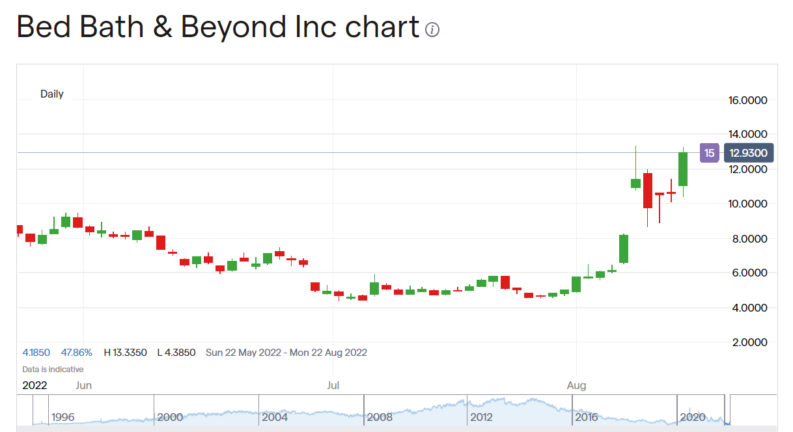Key points:
- Bed Bath and Beyond is not attractive by conventional measures
- But it's a meme stock, lots of people playing in it
- That makes it both interesting and difficult
Bed Bath and Beyond (NASDAQ: BBBY) is, by any of the conventional investment metrics or measures, a complete and total dog. It's a retailer that's lost its way and that's something that really just never does – or rather very rarely – change. It's so far down in the financial weeds that it's having stocking problems and that can lead to the most appalling negative spiral in the finances. Some analysts think it's worth $1 a share, no more and they also think they're being polite at that.
On the other hand BBBY is trading at $14 and change, up a dollar today and 20% Friday. Prices in markets are prices in markets so that's what Bed, Bath is actually worth, not that $ from the analysts. What matters is, of course, the reason (s) for the divergence between the two. The answer is, as so often these days, that BBBY has become a meme stock. There's good reason for that too. The business still looks like a dog, but there is good reason for the meme stock status.
Think back to GameStop (NYSE: GME) and what happened when r/wallstreetbets found it. That was a dog of a retailer too. But the stock soared and not because there's likely to be some grand retail turnaround. Rather, too much of the stock was shorted. That made it possible for an organic short squeeze to happen. Enough retail sector traders pile in and the price starts to rise – shorts have to cover, the price rises again, more shorts have to cover and so on. Given that at times it looked like more than 100% of the GameStop free float was short that was very, very, effective indeed in driving up the price.

Also Read: What Happened To Meme Stocks?
And that's what could change things for BBBY. Retail usually works – or at least often – on negative working capital. It's possible to sell the stock, sometimes many times over, before having to pay for it. Which is great. Until and unless suppliers get edgy about payment. At that point the credit insurers start to pull cover and that working capital benefit goes into reverse. The retailer needs ever more working capital to keep stock on the shelves because suppliers want advance payment in the absence of insurance.
The answer to this problem is more capital. Which is exactly what being a meme stock did for GameStop and AMC. Neither was an entirely rational happening but the stock prices were driven up so high that new capital could be raised without excessive dilution. If that were to happen at BBBY then short term problems could be solved. The big question is, well, is it going to happen? Even if it does there's still the problem of revitalising the chain.
Really, trading in Bed Bath and Beyond depends upon how successful the meme stock ramp is going to be.




